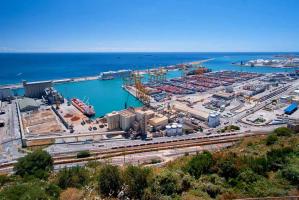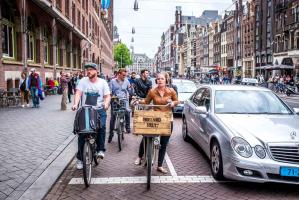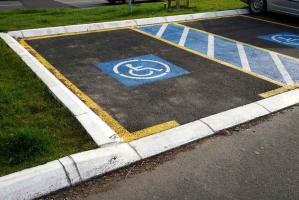Amsterdam bans creation of new hotels
Another piece in the overall strategy to reduce tourist flows to the city
 TheMayor.EU logo
TheMayor.EU logo What can be done to prevent the spread of climate-related lies online?
The Internet, more often than not, has served as a breeding ground for climate change denial and disinformation jeopardising efforts against global warming. This has prompted calls for Big Tech to implement stricter disinformation policies to tackle greenwashing and avoid delays in decarbonising the global economy.
Social media channels are overflowing with content that serves up myths such as “the planet’s rising temperature is normal”, “cold weather means global warming is not happening” or “China is the only country affecting climate change” despite enacted disinformation policies.
For instance, Climate Action Against Disinformation (CAAD), a global coalition of over 50 leading climate and anti-disinformation organisations, in their May 2023 report, stated that Google in infringement of its own policies has been monetising videos channelling climate disinformation on its YouTube platform.
In this regard, we stand to ask ourselves: Why does climate disinformation continue to spread? What are the consequences of this for us? And what can we do about it?
The 2023 CAAD report found that climate denial is making a strong comeback as climate disinformation, propelled by fossil fuel companies, circulates online on social media platforms.
According to Reuters, more than 450 scientists, in 2022, declared that “advertising and PR efforts by fossil fuel companies ... seek to obfuscate or downplay our data and the risks posed by the climate crisis.”
Research has found that oft-employed disinformation strategies consist of labelling green energy expensive and aggravating the cost-of-living crisis, along with casting aspersions over green technology reliability. The aim is to find a global ground for climate scepticism with “over wokeness'' serving as a derogatory screen for disinformation tactics.
Boston University (BU) researchers as part of their year-long project “Data and Misinformation in an Era of Sustainability and Climate Change Crises” examined the leviathan of climate disinformation prevalent on Twitter and Reddit. They looked at over 22,000 tweets spreading climate disinformation and discovered that over 60 Twitter accounts promoting climate disinformation were funded by ExxonMobil, the largest publicly traded oil and gas company in the world.
Sander van der Linden, climate misinformation advisor to Meta and Google platforms and professor in social psychology in society at Cambridge University, has stated that “Actors who push climate disinformation are often deeply entangled with other forms of disinformation, too”.
Professor Van der Linden further stated that “Anti-vax, anti-climate, pro-Russia and New World Order conspiracy theories now go hand-in-hand”.
Moreover, researchers at Indiana University have found that algorithmic-based endorsements and social media content shared amongst friends are likely to act as a catalyst for the spread of climate disinformation.
The uptick of climate disinformation activity on social media platforms frequently coincides with the organisation of key climate events such as Conference of the Parties (COP) summits, major environmental disasters, and the release of the U.N.'s Intergovernmental Panel on Climate Change (IPCC) reports.
According to Professor Van der Linden, climate disinformation has also resurged in a prominent way since Elon Musk’s acquisition of Twitter.
As per company sources, stronger reliance on Twitter is now being placed on content automation instead of human moderation.
Digital rights and environmental campaigners, however, believe that stricter enforcement of disinformation policies can force companies like Twitter to make an impactful dent in the spread of climate disinformation.
A different investigation in 2022, by the UK’s Centre for Countering Digital Hate, found that almost half of the posts connected to climate change deniers on Facebook were devoid of fact-checking labels. This investigation was conducted against the backdrop of Facebook whistleblower Frances Haugen’s allegations that the company had engaged in misleading investors over its efforts to counter climate change and COVID-19 misinformation.
In its response, Facebook stated that its labelling rollout had not been complete at the time of the investigation, whilst stating that there were “no one-size-fits-all solutions to stopping the spread of misinformation”.
The IPCC report identified false information and the “politicisation of science” as the main barriers to climate action. The U.N. climate science panel stated that “vested economic and political interests ... undermine climate science”. Its analysis also points the finger at fossil fuel companies as culpable in engaging in public deception about climate science and policy by spreading disinformation about climate change.
Jennie King, head of climate research and policy at the Institute for Strategic Dialogue, believes that even though climate denial has been relegated to the margins, climate disinformation strategies can have the profound effect of delaying meaningful climate response.
According to her, “There is a great danger in assuming that issues like climate are a 'settled matter' or that key arguments have been won”.
Several environmental groups posit that governments and Big Tech must prevent fossil fuel companies from creating paid advertisements, which in turn end up being a massive source of greenwashing.
The key towards unlocking a future free from climate disinformation rests upon stopping the behaviours and tools of malign actors, on the one hand, (by changing harmful algorithms, identifying tactics, improving online transparency, restricting advertising, supporting community notes, etc.), together with building resilience in our communities against climate disinformation, on the other, (through media literacy, accessibility and diversity in news sources, capacity building and more).
In order to hamper the spread of online disinformation, it is essential for digital content consumers to acquire skills that allow them to recognise and categorise harmful media content and improve their competence to distinguish between facts and fakes. A good example of such counter-disinformation initiatives involving civil society are pan-European projects such as Read Twice.
Capacity-building projects that focus on fostering such skills among different target audiences have the potential to drastically alter the landscape of climate action by driving societal resistance against the propaganda of climate denial and greenwashing.
Alongside the projects working on the ground to combat climate disinformation, the regulatory response, in the face of online climate disinformation proliferation, needs to be robust. Regulations in the vein of EU’s Digital Services Act, drafted on the premise of co-regulation as opposed to self-regulation and inclusive of diverse stakeholders from online platforms to fact-checkers, civil society organisations and media representatives, can potentially transition the regulatory landscape towards a multidisciplinary and multi-stakeholder approach that promotes solutions to tackle those types of false narratives in the longer run.
Climate disinformation can have devastating effects on climate action and global response to climate change. The need of the hour is for the civil and regulatory initiatives to work in tandem to upset the apple cart of climate change deniers and shift society’s focus towards a climate-resilient future.
This article is part of Read Twice – an EU-funded project, coordinated by Euro Advance Association that targets young people and aims to counter disinformation and fake news by enhancing their skills to assess critically information, identify vicious and harmful media content and distinguish between facts and opinions, thus improving their media literacy competences.
The contents of this publication are the sole responsibility of its author and do not necessarily reflect the opinion of the European Union nor of TheMayor.EU.

Legislators and magnates have to await a preliminary ruling from the European Court of Justice

The building will then serve as the site for a new museum dedicated to Finnish-Russian relations

Another piece in the overall strategy to reduce tourist flows to the city

In addition, the federal government has launched the National Week of Action against Bicycle Theft to raise awareness of the issue and the new solution

The facility will replace the need to have water supplied by tankers from Valencia

Modern traffic lights do more than regulate the flow of vehicles at crossroads, they also collect enormous amounts of data

Experimenting with public transport provision in Germany is clearly in a state of creative fervour

Legislators and magnates have to await a preliminary ruling from the European Court of Justice

It also set the standards for a better European parking card for people with disabilities

The benefit will last until the Dutch parliament adopts the transgender law

Experimenting with public transport provision in Germany is clearly in a state of creative fervour

It also set the standards for a better European parking card for people with disabilities

Urban dwellers across the EU are having a say in making their surroundings friendlier to people and the environment.

Forests in the EU can help green the European construction industry and bolster a continent-wide push for architectural improvements.

Apply by 10 November and do your part for the transformation of European public spaces

Catch up with some recommendations for the 2024 European Capital of Culture programme from the mayor of Tartu

An interview with the ICLEI regional director for Europe аfter the close of COP28

An interview with a member of the No Hate Speech Network team













